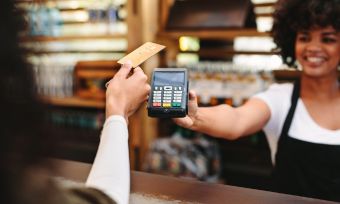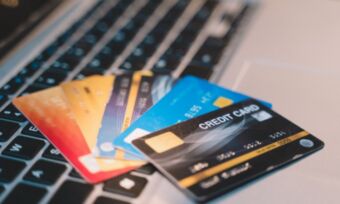PayPal vs credit card payments
It’s important to know that any payment portal you use is secure, so when it comes to the question of PayPal vs credit cards, it’s important to understand the pros and cons to each.

It’s important to know that any payment portal you use is secure, so when it comes to the question of PayPal vs credit cards, it’s important to understand the pros and cons to each.
Key points:
- PayPal and credit cards are two of the most popular ways to pay online, but but come with risks.
- Storing your credit card details on online portals may seem convenient, but can be risky.
- PayPal can also be vulnerable to hacking if details are stored on your device.
Handing over payment information online should always be done with caution and after making sure that the site you’re using is secure. Credit, debit cards and PayPal are certainly some of the most popular options for payment when online shopping, and while the ‘best’ one will depend on your needs and circumstances, it’s still worthwhile to weigh your options up.
Here are some of the pros and cons of using a credit card, a debit card or a PayPal account to make online payments.
Is it better to use a credit card or debit card for online purchases?
When deciding if you should use a credit or debit card to make online purchases, it’s a good idea to consider some of the pros and cons of these payment methods.
What are the pros?
- You can see every card transaction as it’s recorded on your transaction history; which includes details that could help you verify if the charge is legitimate. Your financial institution’s app may also be able to send you real-time notifications to alert you every time your card is used.
- If your details are stolen online you can easily lock or cancel your credit or debit card through your online banking portal or by calling your bank directly.
- Most credit cards come with a fraud protection guarantee, which means users will be reimbursed for any fraudulent transactions that occur on their card.
- Credit and debit card providers actively look for suspicious fraudulent transactions on your card, and you can easily query transactions you don’t recognise.
- Microchipping, PIN numbers and CVV combined make your credit or debit card more secure.
- Some debit and credit cards offer no currency conversion fees, which could be handy for purchasing from international stores.
- Some credit cards come with insurance which could cover certain items purchased on that card.
What are the cons?
- Probably the most significant con for using a credit or debit card online is that there has been an increase in online credit and debit card fraud as online payment activity increases.
- Having to re-enter your credit or debit card details at various online checkouts can be a bit of a hassle. But while it might seem convenient when you are prompted by your internet browser or website to save the card details for next time, that might not be a good idea. Storing your card details and address directly onto websites or accounts could make your money and private details vulnerable to potential hackers and company data breaches.
- Some credit and debit cards may apply a currency conversion fee when making purchases from an international store.
Explore further → Debit cards vs credit cards
Compare Low Rate Credit Cards with Canstar
The table below displays some of our referral partners’ low rate credit cards for Australians spending around $2000 per month. The results shown are sorted by highest Star Rating, then lowest purchase rate, then alphabetically by provider name. Consider the Target Market Determination (TMD) before making a purchase decision. Contact the product issuer directly for a copy of the TMD. Use Canstar’s credit cards comparison selector to view a wider range of credit cards. Canstar may earn a fee for referrals.
 24hr approval available
24hr approval available
 Apply in full online
Apply in full online
 Fraud protection
Fraud protection

0.00% p.a. interest rate on balance transfers for 24 mths. Rate reverts to 12.99% p.a. Balance transfer fee of 3% applies. Offer available until further notice. See provider website for full details. Terms and conditions apply.
 Apply in full online
Apply in full online
 Fraud protection
Fraud protection

0.00% p.a. interest rate on balance transfers for 24 mths. Rate reverts to 12.99% p.a. Balance transfer fee of 3% applies. Offer available until further notice. See provider website for full details. Terms and conditions apply.
 Apply in full online
Apply in full online
 Fraud protection
Fraud protection

Get $350 Back once you spend $1,000 or more on eligible purchases you get $50 cashback for each month for 7 consecutive statement periods. Offer available until further notice. See provider website for full details. Terms and conditions apply.
 24hr approval available
24hr approval available
 Apply in full online
Apply in full online
 Fraud protection
Fraud protection

0.00% p.a. interest rate on balance transfers for 24 mths. Rate reverts to 21.99% p.a. Balance transfer fee of 2% applies. Offer available until further notice. See provider website for full details. Terms and conditions apply.
 24hr approval available
24hr approval available
 Apply in full online
Apply in full online
 Fraud protection
Fraud protection
Canstar is an information provider and in giving you product information Canstar is not making any suggestion or recommendation about a particular credit card product. If you decide to apply for a credit card, you will deal directly with a financial institution, and not with Canstar. Rates and product information should be confirmed with the relevant financial institution. For more information, read Canstar’s Financial Services and Credit Guide (FSCG), detailed disclosure, important notes and liability disclaimer. Products displayed above that are not “Sponsored or Promoted” are sorted as referenced in the introductory text and then alphabetically by company. Canstar may receive a fee for referral of leads from these products. See How We Get Paid for further information.
Is it better to use PayPal for online purchases?
PayPal can be convenient and easy to navigate, but if you’re worried about the security of using this online payment system, it’s a good idea to consider some of the following pros and cons.
What are the pros?
- You don’t have to enter card details every time you buy something online. PayPal stores all your payment information .
- Your financial details and transactions are encrypted and monitored to help prevent fraud and identity theft. If you are concerned something might have gone wrong on your account, you can report it to PayPal and it will handle any unauthorised transactions.
- You can enable multi-factor authentication for logging into your PayPal account, adding another layer of security to your cards and money.
- If your eligible PayPal purchase doesn’t arrive or is significantly different to the seller’s description, you have Buyer Protection. According to PayPal, it can reimburse you for the full price plus shipping costs, up to $20,000 per item. See PayPal’s Buyer Protection page for full details.
- If you link a rewards credit card to your PayPal account you can still earn points with most cards when purchasing through PayPal. Also, if you use a credit card as a payment method for PayPal, you may also be eligible for an extra layer of protection with your credit card’s fraud protection. However, not all cards offer this, so check your provider’s terms and conditions.
What are the cons?
- PayPal is a large, worldwide payments system and as such is liable to many threats from online hackers.
- If an international store does not accept Australian dollars, PayPal converts the currency for you, charging the current wholesale exchange rate and a percentage above that.
- If you have all your login details saved and pre-filled on your computer or mobile device, it could make it easier for someone to log into your device and take advantage of the bank and card details stored on your account.
- Not all cashback and credit card rewards programs work with PayPal.
- PayPal has its own set of user rules, and if it deems that you have violated those rules, the company could freeze or put restrictions on your account.
Related: What is a Digital Wallet?
Is it safer to use PayPal or a credit card?
Whether you are using a credit/debit card or your PayPal account to make online purchases, you still need to be aware of how to keep your private information secure on the web. Check out some of the following tips for staying safe online:
- Only buy from reputable websites and online retailers. Look out for the padlock symbol and “https” at the start of the web address (“s” stands for secure).
- Double check all details of your purchase before confirming the payment.
- Make sure to always log out of sites you’ve made a purchase.
- Keep an eye on your bank and credit card statements regularly to check for any suspicious transactions.
- Make sure your antivirus and browser software is up to date.
- Watch out for phishing emails. Generic greetings like “Dear user”, odd-looking logos, strange statements, bad spelling or grammar and requests for private or financial details should all be considered red flags.
- Watch out for scams – if anything seems too good to be true, it probably is.
- Report potential fraud, unauthorised account activities or fake emails to your financial institution or PayPal as soon as possible.
- Always use strong passwords and avoid using the same password across different accounts.
- Switching your phone, tablet or other device? Make sure to completely delete all your banking apps, PayPal app and data before trading it in.
Cover image source: fizkes/Shutterstock.com
This article was reviewed by our Content Editor Alasdair Duncan before it was updated, as part of our fact-checking process.


0% p.a. interest rate on balance transfers for 24 mths. Rate reverts to 21.99% p.a. Balance transfer fee of 2% applies. Offer available until further notice. See provider website for full details. Terms and conditions apply.
Try our Credit Cards comparison tool to instantly compare Canstar expert rated options.






